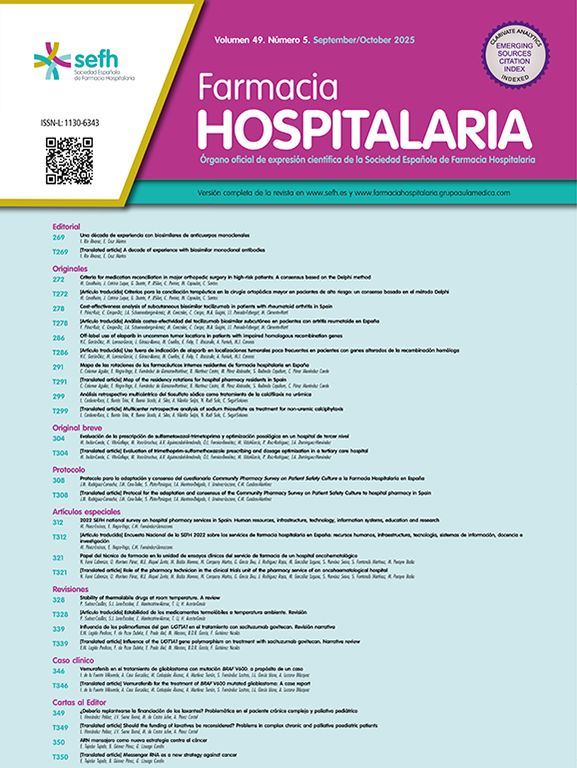The increased number of adverse effects from medicines occurring due to various discrepancies and medication errors at the time of a patient's discharge from hospital has lead us to develop measures to resolve these issues. The aim of this study is to present the methodology and design of a hospital discharge information programme and to describe the most representative findings.
MethodsA common methodology was established and patients from 5 different hospitals were included in a hospital discharge information programme. An informative interview was carried out at the time of discharge and oral and written information was given regarding the patient's complete treatment at that point. After 7 days a follow up telephone call was made to assess our intervention. The information was collated and the patients’ satisfaction with the programme was measured.
ResultsSix thousand hundred ninety-eight patients were included in the programme, 4955 (79.86%) were informed. Six thousand four hundred fifty-four interventions were carried out (980 to improve the efficiency of treatment, 531 the efficiency of safety, 4770 informative interventions, and 107 directed at other levels of care). Seven days later 4174 patients were contacted. Fourteen point fifty-three percent presented a problem with their medications, 8.96% had solved the problem by the time the call was made and 4.4% found that the instructions given to them at the time of being discharged from hospital helped them to solve the problem. There was a high level of satisfaction with the service (4.64 points out of 5).
ConclusionsIt is possible to develop a hospital discharge information programme as a care service. A high level of satisfaction has been achieved and safety has improved with regards the use of medication.
El elevado número de acontecimientos adversos por medicamentos que ocurren debido a discrepancias y errores de medicación al alta hospitalaria, nos obliga a establecer medidas para resolverlos. El objetivo de este trabajo es exponer la metodología y el diseño de un programa de información al alta hospitalaria asistencial, y describir los hallazgos más representativos.
MétodoSe estableció una metodología común para que pacientes de 5 hospitales fueran incluidos en un programa de información al alta hospitalaria. Se realizó una entrevista educativa al alta y se entregó información oral y escrita de su tratamiento completo en ese momento. A los 7 días se realizó un seguimiento telefónico para valorar nuestra intervención. Se recogieron las intervenciones realizadas y semidió la satisfacción del paciente con el programa.
ResultadosSe incluyeron en el programa 6.198 pacientes, se informó a 4.955 (79,86%). Se realizaron 6.454 intervenciones (980 para mejorar la eficiencia del tratamiento, 531 de seguridad, 4.770 educativas, y 107 dirigidas a otros niveles asistenciales). A los 7 días postalta se contactó con 4.174 pacientes. Presentaron algún problema relacionado con los medicamentos un 14,53%, el 8,96% lo había solucionado en el momento de la llamada y un 4,4% refirió que las instrucciones recibidas al alta le ayudaron a solucionarlo. La satisfacción con el servicio fue muy alta (4,64 sobre 5 puntos).
ConclusionesEs posible establecer un programa de información al alta como servicio asistencial. Se ha conseguido un alto nivel de satisfacción y mejorado la seguridad en el uso de medicamentos.





